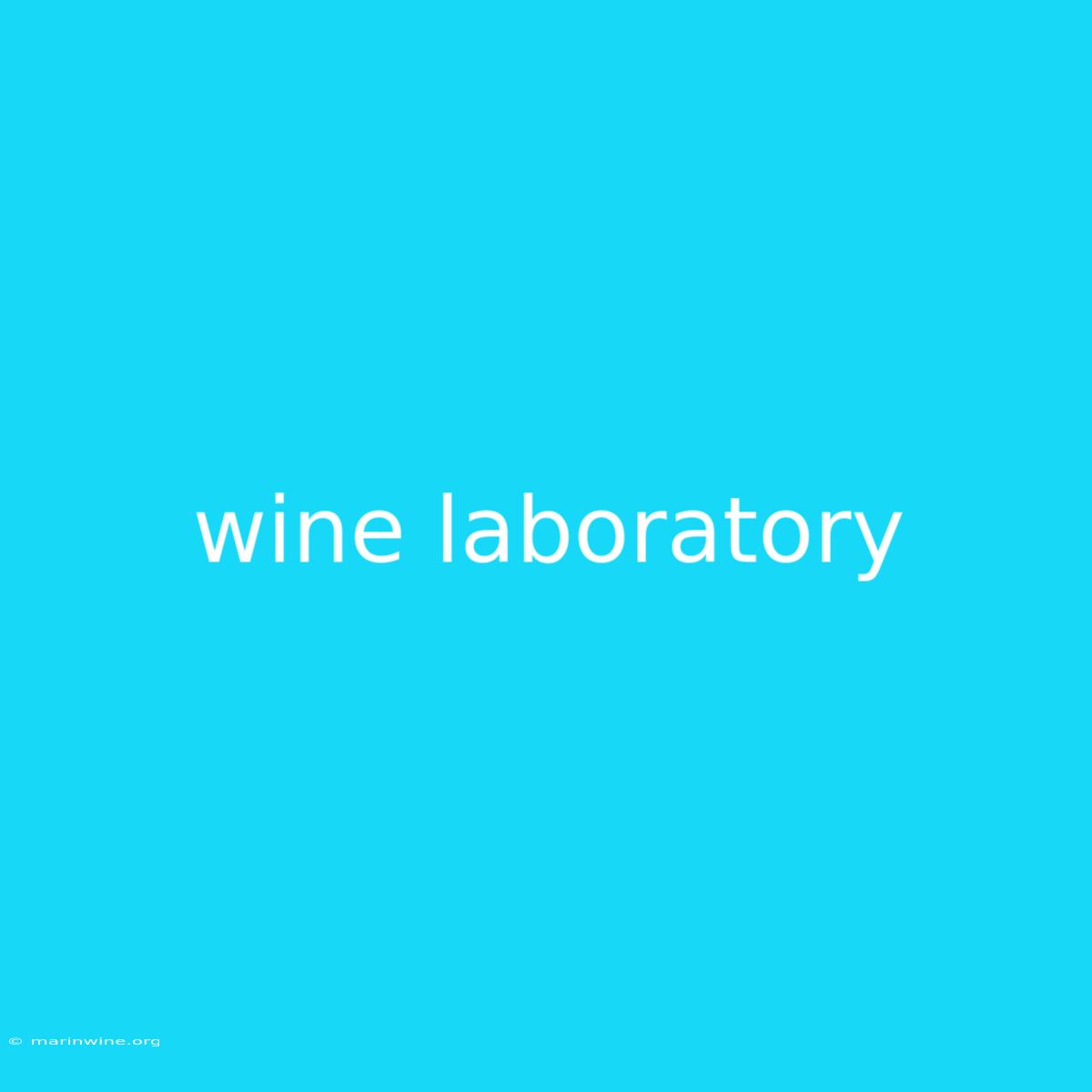Unveiling the Secrets of Wine: A Glimpse into the World of Wine Laboratories
Have you ever wondered what happens to wine after it's bottled? The answer lies within the fascinating world of wine laboratories, where science and passion collide to ensure the quality and consistency of your favorite beverages.
Why It Matters: Wine laboratories play a crucial role in the modern wine industry. They act as guardians of quality, ensuring that every bottle meets specific standards and delivers a consistent taste experience. From analyzing grape composition to identifying potential flaws, these labs are essential for both winemakers and consumers.
Key Takeaways of Wine Laboratories:
| Key Takeaways | |
|---|---|
| Quality Control | Ensuring consistency and meeting high standards. |
| Scientific Analysis | Utilizing advanced techniques to identify and understand wine characteristics. |
| Innovation | Driving research and development for new winemaking techniques and grape varieties. |
| Consumer Protection | Guaranteeing the authenticity and safety of wine products. |
Wine Laboratories: A World of Scientific Expertise
Wine laboratories are sophisticated facilities equipped with advanced technologies that delve into the complexities of wine composition. They perform a wide range of analyses, including:
- Chemical Analysis: Determining the levels of sugars, acids, alcohol, and other compounds that contribute to the wine's flavor profile and quality.
- Microbial Analysis: Identifying and quantifying beneficial and harmful microorganisms that can impact wine fermentation and stability.
- Sensory Analysis: Evaluating the wine's aroma, taste, color, and texture using expert panels.
- Physical Analysis: Measuring factors like turbidity, clarity, and density, which can influence wine stability and appearance.
Chemical Analysis: Unlocking the Secrets of Flavor
Chemical analysis is at the heart of wine laboratory operations. By carefully measuring the concentrations of various compounds, winemakers can understand:
- Acidity: High acidity contributes to freshness and balance, while low acidity can lead to flatness.
- Sugar Content: This affects sweetness levels and influences the alcohol content after fermentation.
- Tannins: These compounds provide structure and aging potential, affecting the wine's mouthfeel and flavor complexity.
- Volatile Compounds: These can influence aroma and contribute to faults like "corked" wine.
Microbial Analysis: Ensuring Purity and Stability
Wine is a living product, and microbial activity plays a crucial role in its development. Wine laboratories utilize microscopic analysis to:
- Identify Beneficial Yeasts: These organisms are responsible for fermentation, converting sugars into alcohol.
- Monitor Malolactic Fermentation: This process softens acidity and adds complexity, but it also requires careful control.
- Detect Spoilage Organisms: These can cause unwanted changes in flavor and stability, requiring immediate intervention.
Sensory Analysis: The Human Element of Wine Evaluation
While science provides objective data, human perception plays a vital role in wine evaluation. Sensory analysis relies on trained individuals to assess:
- Aroma: Identifying the primary and secondary aromas that contribute to the wine's overall character.
- Taste: Evaluating the balance of sweetness, acidity, tannins, and bitterness.
- Appearance: Assessing the wine's color, clarity, and brightness.
- Mouthfeel: Evaluating the texture, weight, and presence of tannins on the palate.
FAQ for Wine Laboratories
Q: What are the main challenges faced by wine laboratories? A: Maintaining accuracy, consistency, and speed in analysis, while adapting to new technologies and emerging trends.
Q: How do wine laboratories ensure the authenticity of wine? A: Through techniques like isotopic analysis, which helps identify the origin of grapes and prevent fraud.
Q: Can wine laboratories improve the quality of wine? A: Yes, by providing crucial data and insights that help winemakers make informed decisions and optimize winemaking processes.
Q: Are all wine laboratories the same? A: No, different labs specialize in specific areas of analysis, such as microbial analysis, sensory analysis, or chemical analysis.
Q: What are the future trends in wine laboratories? A: Increasing automation, integration of artificial intelligence, and focusing on sustainability and traceability.
Tips for Wine Enthusiasts
- Visit a wine laboratory: Many wineries offer tours of their laboratories, giving you a firsthand look at the science behind winemaking.
- Pay attention to the label: Look for indications of laboratory analysis, such as "certified organic" or "quality control" labels.
- Support wineries with dedicated laboratories: Your choice can make a difference in ensuring quality and responsible practices in the wine industry.
Summary by Wine Laboratories
Wine laboratories are essential partners in the world of winemaking, blending science and passion to ensure the quality, consistency, and authenticity of our beloved beverages. Through advanced analysis and human expertise, they help us understand the complexities of wine, safeguard its integrity, and celebrate the art of winemaking.
Closing Message: The next time you raise a glass, take a moment to appreciate the invisible work that goes into crafting every sip. Wine laboratories play a vital role in ensuring the quality and pleasure of our wine experiences, reminding us that there's a world of science and dedication behind every bottle.

